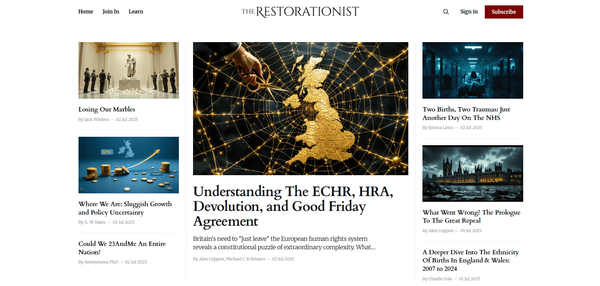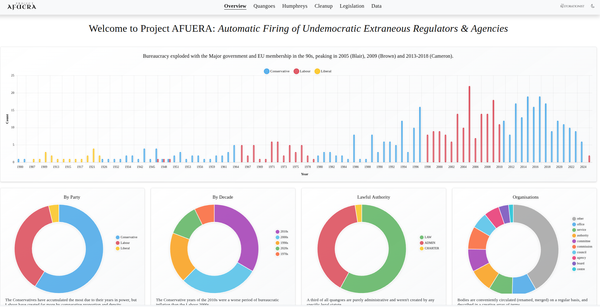Uncaging The Slumbering British Lion
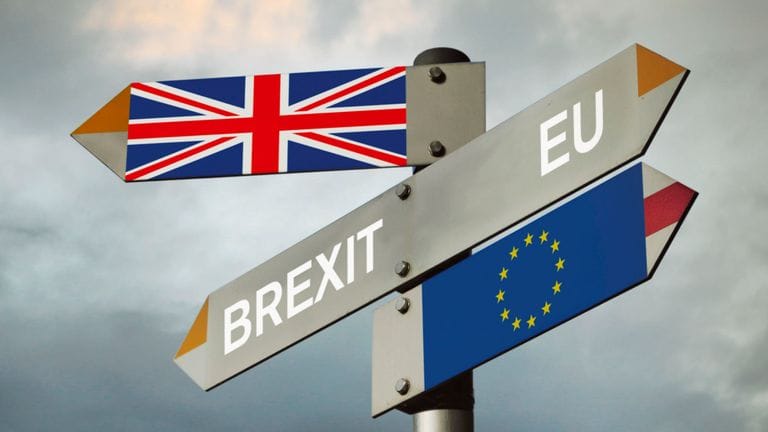

There’s a myth Brits complain. It’s a shallow analysis and stereotype for those who are indifferent to history. What is being witnessed is our DNA: every side dissenting about almost everything. Dissent is not a synonym for complaint.
Traveling teaches you many things. But the most profound lesson is the healthiest symptom of a democracy — the worst form of government, apart from all the others — is the extent to which the individual is free to express dissent.
The UK has experienced power battles for centuries. What differentiates Brexit is the disgraceful childishness, manipulative identity politics, and totalitarian smear campaigning associated with New Radical Left groupthink. Dissent and criticism have always been virtuous; holding contrarian views, according to collectivist ideologues, should now be considered symptomatic of a malicious character. If you disagree with political/media orthodoxy, you are a corrupt person.
The Inescapable Legacy of Soft Power
Like it or not, the industrial revolution made England quite literally the centre of the world: what all time and position on planet Earth are measured relative to; originator of the world’s lingua franca; home to the world’s most powerful city; and creator of the most countries(including the US and modern Israel).
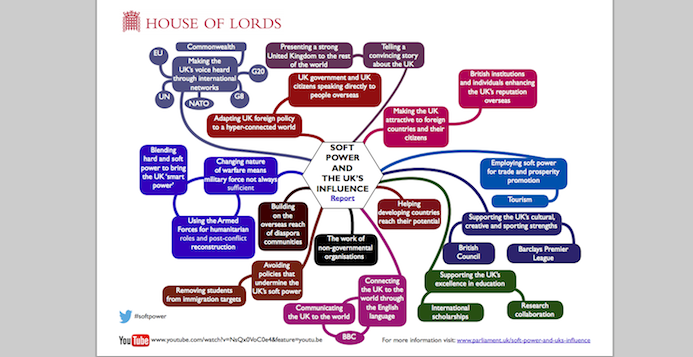
The country is mother to Protestantism, parliamentary democracy, industrialisation, economics, civil liberties and civic rights, public education, telecommunication, dramatism, the postal system, Enlightenment etiquette, the police force, pop music, museums, modern sport, computing, photography, motorised shipping, artificial lighting, the toilet, mass transportation, subterranean transit, cement, sewerage, stainless steel, modern physics, the jet engine, worldwide media, department stores, the air force, antibiotics, refrigeration, television, ATMs, public healthcare, nursing, the world wide web, the explanation of life, its structure, and the discovery of the physical laws it exists within.
Not to mention a huge proportion of what the modern world functions on: the telescope, landscape gardening, hydraulic press, corkscrew, tin can, fire extinguisher, lawnmower, syringe, radio, polyester, gas mask, radar, remote control, electrical motor, synthetic dye, tank, jet engine, vacuum cleaner, carbon fiber, graphene, and so many more. Oh, and the concentration camp.
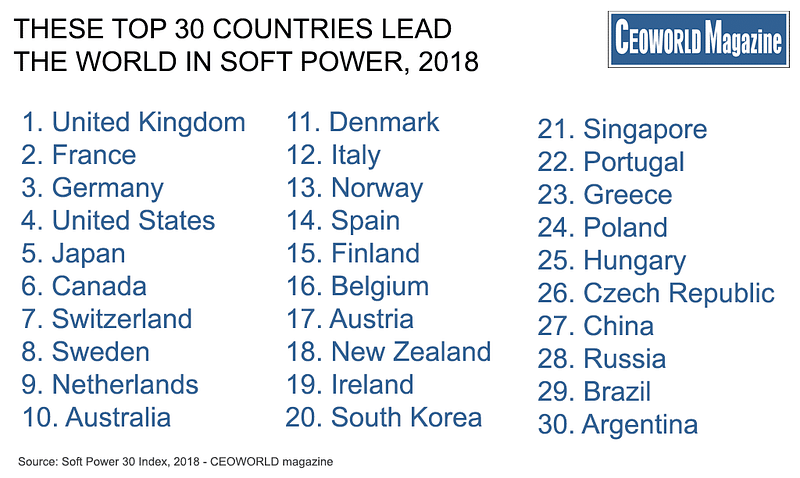
It is objectively the most influential country in history which has invaded all but 22 countries in the world, achieved victory in the two largest wars ever fought, commanded the largest known empire, and consistently wields the most global Soft Power.
Ban This Filth: The Sport of Traditional Contempt
Brits are an odd, paradoxical bunch: longsuffering, orderly, but revolutionary when angered. The depth of our heels in the ground is directly proportional to the pressure we are put under. Look no further than the utter contempt the population hold our institutions in: 83% hate politicians and only 15% coalesce with the main parties; few, if any, give a shit about the monarchy; the media is ignored, and more than 60% think religion is bullshit.
The simple reason we have never further-formalised legal protection of press freedom is most of the population would happily see sanctimonious garbage like The Guardian (the “Shitrag Grauniad”) and the BBC (“British Bullshit Corporation”) ceremonially executed. Few would miss the poisonous villains of Fleet Street celebrating their appallingly cynical antics. The press is persona non grata, and to the journalists, the Great Unwashed (their readers) are simply an inconvenience to whose prejudices they pander for cash.
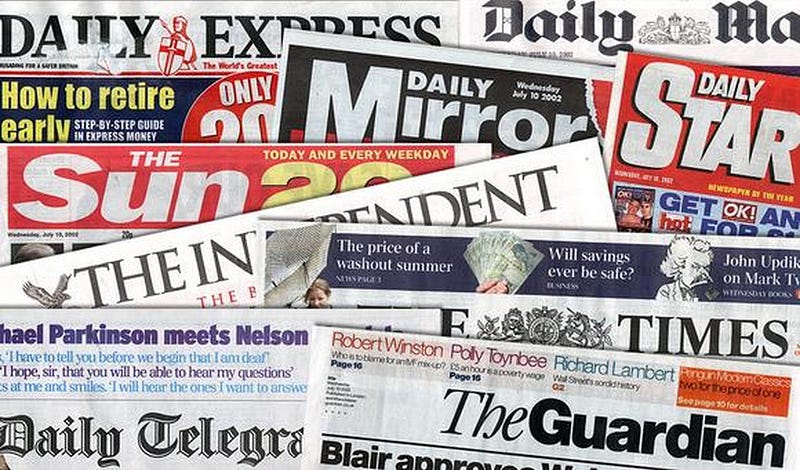
Don’t tell me about the press. I know exactly who reads the papers. The Daily Mirror is read by people who think they run the country; The Guardian is read by people who think they ought to run the country; The Times is read by the people who actually do run the country; the Daily Mail is read by the wives of the people who run the country; the Financial Times is read by people who own the country; the Morning Star is read by people who think the country ought to be run by another country, and the Daily Telegraph is read by people who think it is.
(Jim Hacker, MP)
We’re entirely used to media bias. The idiocy you subscribe to is marked by which newspaper you read. There’s a publication for every prejudice.He

Every day there’s a call to ban someone or something distasteful. Heaven forbid if you actually try to ban them or it, as it’s an intolerable intrusion; unforgivable incivility. The point is merely in expressing the extent of your distaste.
Villages of Stoic Liberalism
It’s an open secret Brits vote far more right wing than they talk. The electoral map is a conservative wipeout; half a million people voted BNPless than 10 years ago; 70+% hate political correctness; 53% want things back as they were; a sizable proportion want the death penalty back, and over two-thirds are proud of the Empire.
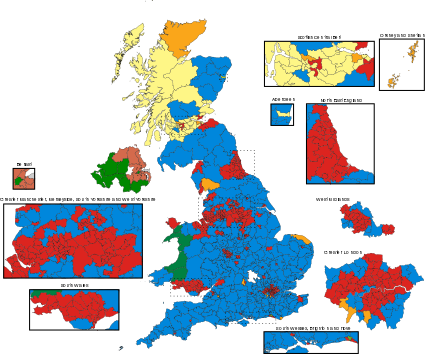
However, this is also from a country where 22% of its citizenry is foreign-born, the head of state and most important politician are female; the home secretary and capital’s mayor are Pakistani. Where 300 languages are spoken in 160 regional dialects, 60% are Christian, and the capital is the 6th largest French city; where there are half as many pets as people, 90% of people have no problem if you’re gay, and 70% are OK with assisted suicide.
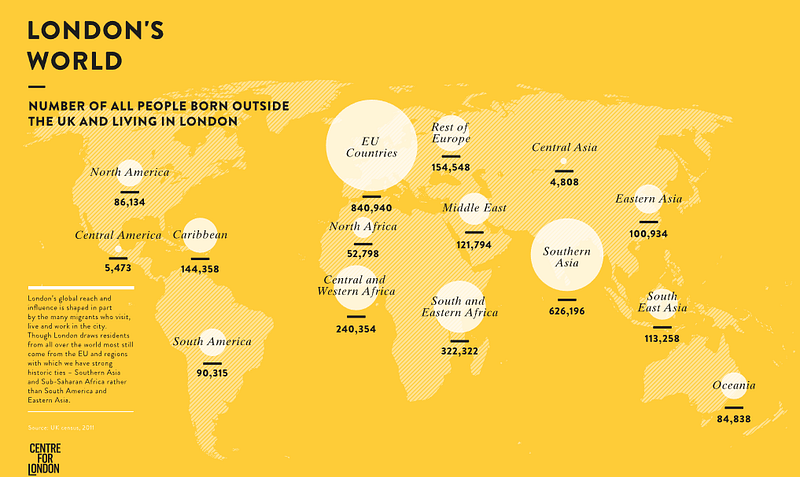
Moreover, where 65% love Americans; 92% have been abroad; only 14% have any kind of criminal record, 60% are married, 70% prefer to live in the countryside, and 61% have brown hair.
But most revealing is the spread across the political spectrum of the last general election (2017).
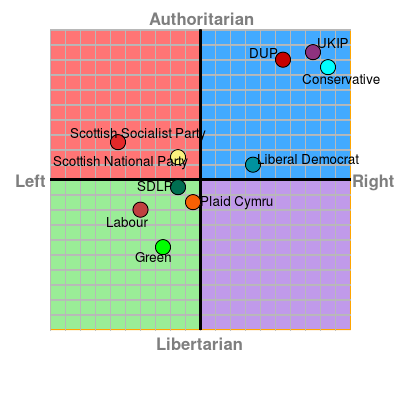
One sector stands out. With the system of UK political parties, right-leaning social libertarians and authoritarian leftists had no representation whatsoever.
If you contrast that with the historical results, British political allegiance becomes more pronounced:
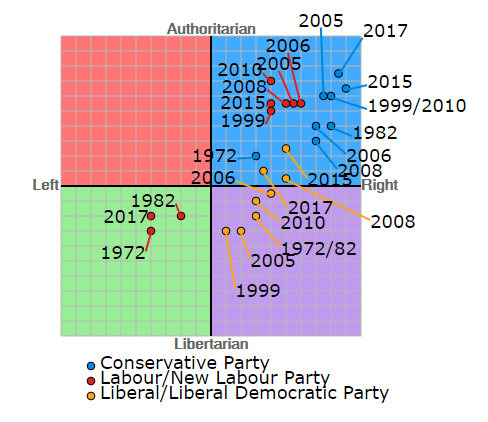
When considering the social fabric with the election results, you might say the British lion has a conservative mind hiding a liberal heart. Or heartless, depending on whom you ask.
If you offer a free referendum to the entire population — in which huge sectors are unrepresented in Parliament — , they will come out to fill the gaps and deliver a result different to party lines. Left-wing authoritarians will support state-planned collectivist ideas, whereas right-leaning libertarians will come out against them. In the home of classical liberalism, it’s no surprise individualistic belief dominated.
The Endless Referendums on Vision & Competence
Brexit is no shock to anyone in the UK. The uncertainty is a referendum on our faith in politicians to actually do as they’re told and do it competently.
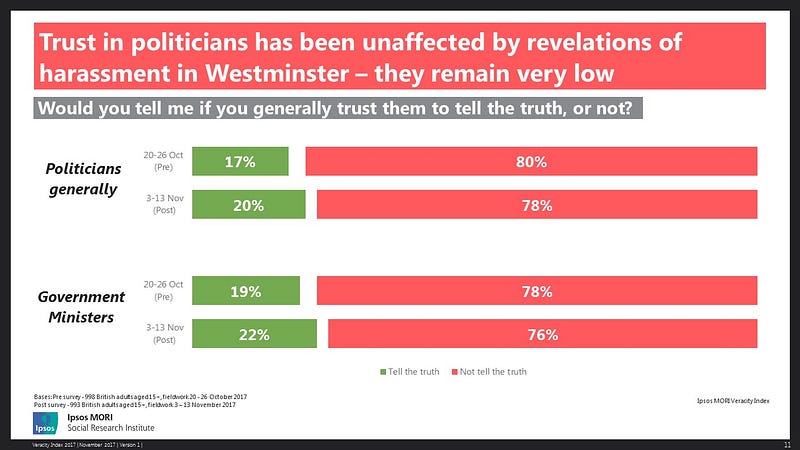
No Deal is No Problem if you have other plans.
Any “2nd Referendum” based on “new information” would cause such a level of unrest we really would need the army on the streets. It might as well feature a more insightfully edited question: do you believe your leaders are competent enough to break away from Europe?
The answer would universally be… no.
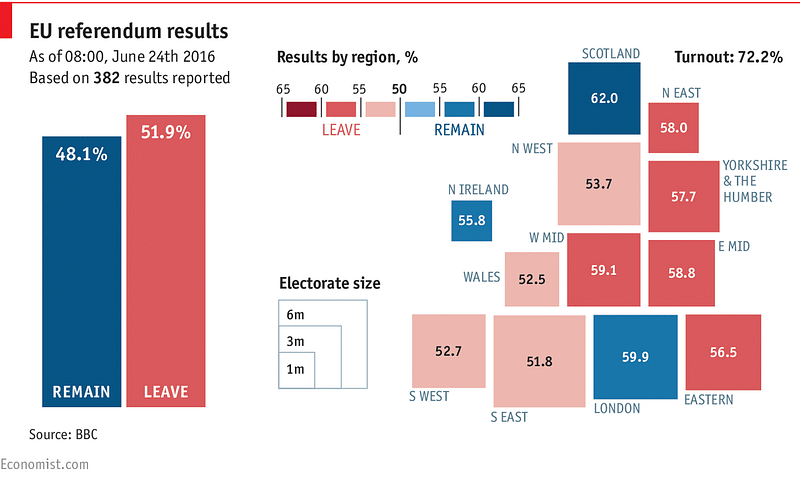
Brexit is only being contested by a few discontented groups: academics who will lose their funding; politicians who lose their career ladder; idealistic students who get their fees paid and have never known a world without it; bankers who will make $10m less than douchebag friends in Frankfurt, medical personnel who rely on imports and immigration; and champagne socialists with a vacation home in the South of France.
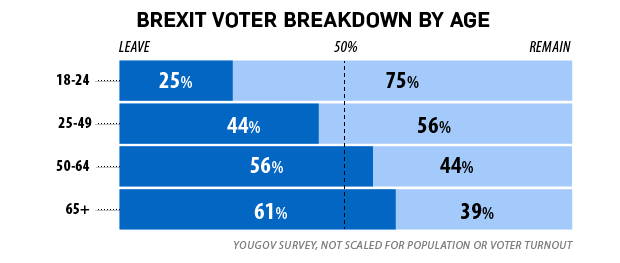
The EU is only a good idea to those who don’t have any other ideas.
Ironically, these are the exact same groups who are held in contempt by most of the population. We all know bankers are criminals, academics are unrealistic idiots, Guardian readers are insufferable, and students are fragile snowflakes. No amount of patter from these people is going to get a bricklayer from Doncaster to change his mind.
Nor is any cynical conspiracy to deliberately mess it up so badly we want to cancel the whole thing, — by our most Machiavellian snakes, the Civil Service — , going to work out well. We all know about Sir Humphrey’s schemes.
The real question is: if the British public believed their politicians were skilful, effective, and ambitious, — and had a plan — how many would have voted to leave the EU?
Democracy: More Important Than Peace
Brits are, put simply, intransigently stoic. Brexit is the latest round in a long tradition of dissent: from blowing up Parliament, to kicking out the Catholic Church, to executing the king, to inspiring others to kick out the king, to expelling MPs, to relentlessly sabotaging Europe, to euthanasing the king, to opposing Germany three times then voting out Churchill, to openly insulting EU politicians in public, and of course, calling for the current PM to be hanged as a traitor.
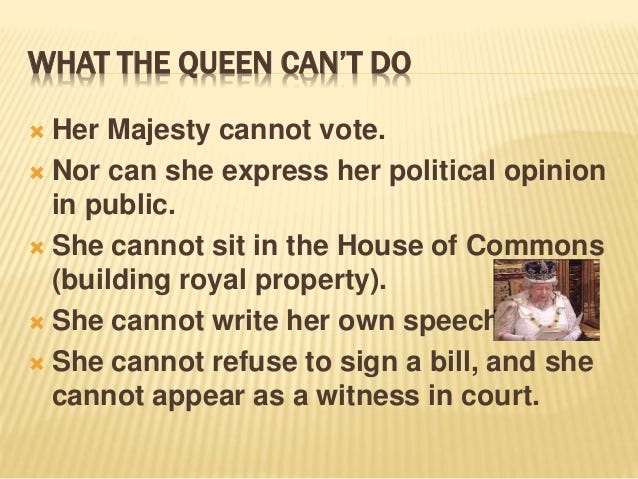
And if you list that to any Brit, you’ll see a subtle, wry smile appear on their face. Which tells you all you need to know. This is who we are, and what we do. We’re not really complaining. We’re sticking a polite middle-finger up.
Everyone loves the idea of a peaceful Europe, even if we have to suffer French protectionism of its useless farmers, or Germany’s attempts to prove to the world it is now completely different to its inclusion in the most murderous pages of history by adsorbing cheap middle-eastern factory labour en masse.
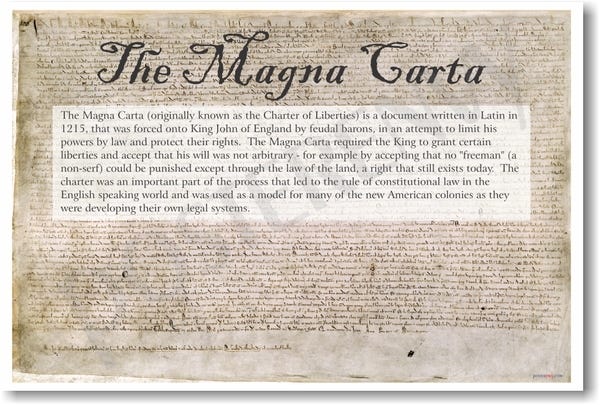
British democracy is ancient. And when we say old, we’re talking pre-13th century Magna Carta. The fundamental relationship between the monarch (and/or government) and the people is one of direct access and submission to the Rule of Law. Put simply, authority is derived from the people, by consent, and crucially — directly. People have always felt a sense of direct connection to their representatives.
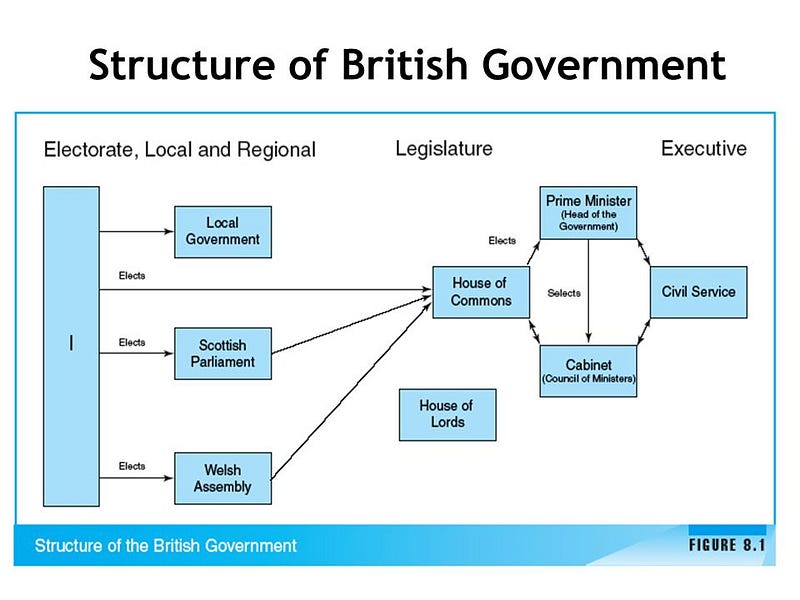
When Germany’s Chancellor demands countries give up their sovereignty to the “greatest parliament in the world” on the back of an arms deal with France, you’re not going to receive a warm reception in Britain.
Tony Benn, much-loved radical socialist who stood against almost everything Brits generally agree with (and was loved even more for it), defined 5 questions anyone in a democracy should ask:
“What power have you got?”
“Where did you get it from?”
“In whose interests do you use it?”
“To whom are you accountable?”
“How do we get rid of you?”
This “free trade area” now has a flag, an anthem, a president, a parliament, a central bank, a currency, a supreme court, a foreign minister, and next, an army. Moreover, it’s economically dominated by Germany. Macron has openly called for the EU to become an empire. Napoleon and Von Bismarck’s dreams have become a reality.
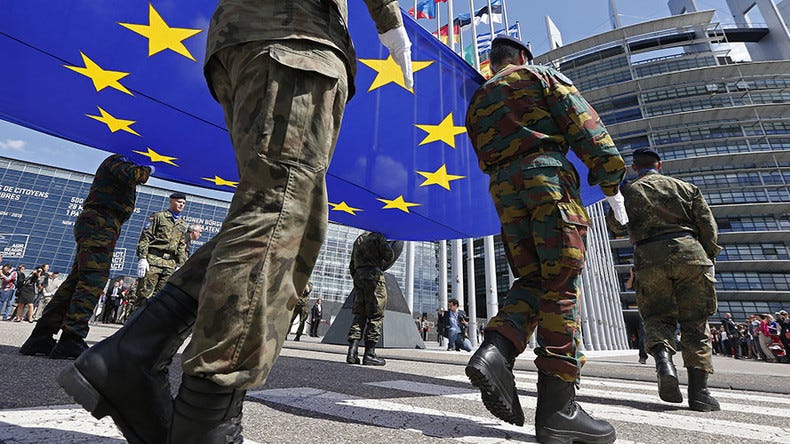
“Europe’s nations should be guided towards the superstate without their people understanding what is happening. This can be accomplished by successive steps, each disguised as having an economic purpose, but which will eventually and irreversibly lead to federation.”
Jean Monnet, “Founding Father” of the EU, April 30 1952, just 7 years after the bloodiest war of imperialism in human history
It looks like a duck, it quacks like a duck, and waddles like a duck. But according to the EU and those in pathological denial, it isn’t actually a duck.
It doesn’t care how you vote, the individual can’t remove it; but most worryingly, it has developed a recurrent strategy where it rebrands the ideas ordinary citizens reject into obscure backdoor “treaties” once enough time has gone by to forget about them. It even thinks it has the right to ban memes.
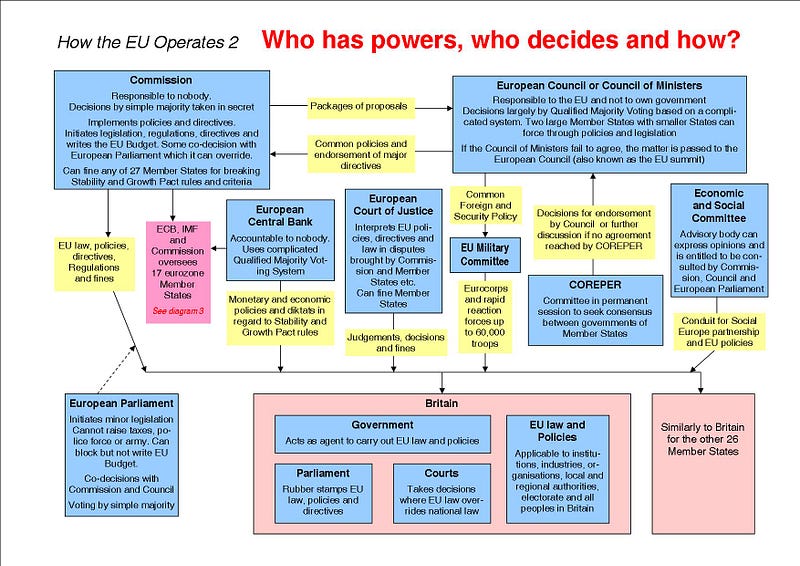
None of the 5 questions are remotely answerable, and most importantly, it is now openly punishing a state for attempting to leave. Time’s up for the quixotic “brotherhood of man” idea.
Centralisation of power is bad. It’s been bad since the beginning of human history because humans are fundamentally bad. When power is accumulated and centralised — including the Empire days — it is invariably abused. Democracy works best — as do all the systems, such as the Rule of Law — the more localised it, and they, are.
Nobody can remember voting for this
In 1972, the post-war UK opted into an economic zone with 6 other countries (the EEC), which was ratified by domestic referendum in 1975 (60%+ in favour).
Since 1993, when the economic union became a political one via the obscure Maastricht Treaty (which gave birth to the Referendum Party and UKIP), parliamentary politics has been dominated by discontent over the price of continued participation.
Brexit was the conclusion to 23 years of dissent: the British people weren’t given a choice two decades ago (because they may have said no), and when they finally were, they said no more.
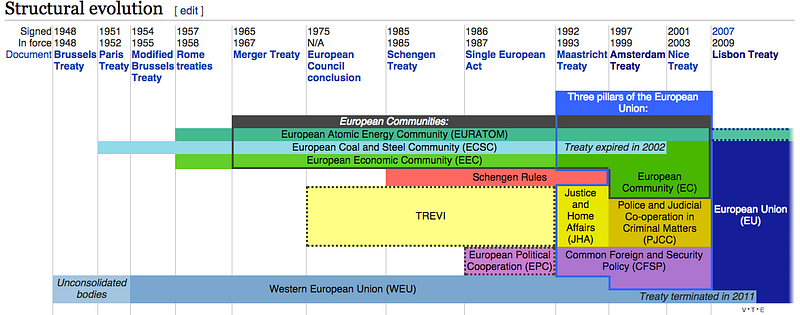
Switzerland rejected the EU. Norway rejected the EU. Greece nearly left in 2015. France rejected the EU Constitution and now wants out. Holland rejected the EU Constitution. Ireland rejected the backdoor treaty that bypassed the vote for the EU constitution. Poland isn’t happy. Hungary definitely isn’t happy. The Czech Republic want a referendum. Trouble is brewing in Italy.
Yes, it has MEPs. But they are meaningless and have no power whatsoever.
The political country of the EU was deceitfully laundered into existence by an obscure treaty made between governments without the explicit consent of any of its people. Nobody voted for it. A referendum to establish said consent was refused.
It was laundered in as our “future” because three decades of political meandering by useless politicians failed to conceive and/or deliver any other.
In 1932, merely 15 years after the most unspeakably bloody war in human history that no-one thought could happen again, Parliamentary backbenchers stood alone in sounding the warnings over danger emerging from the ashes of WWI, as the British political class attempted to appease Europe. Whilst the greater region struggled to adapt to Stalin’s corruption of the Russian Revolution and initiation of the USSR, fascism developed in Italy, and the US maintained its nationalistic withdrawal as it recovered from shock.
In 2019, we find the UK standing alone again, sounding a warning over what is happening in Europe, as an aggressive Russia plots divide er impera.
Ideology Only Poisons the Weak
Having children induces an intrinsic fear and concern for the future they will inherit. It’s no small coincidence these “leaders” — the premiers of Franch, Germany, Ireland, Scotland, Holland, Sweden, Luxembourg, Lithuania, Romania, and the UK are all biologically childless, despite Snopes’ barely-disguised pandering that the smaller countries are not due to their step-progeny.
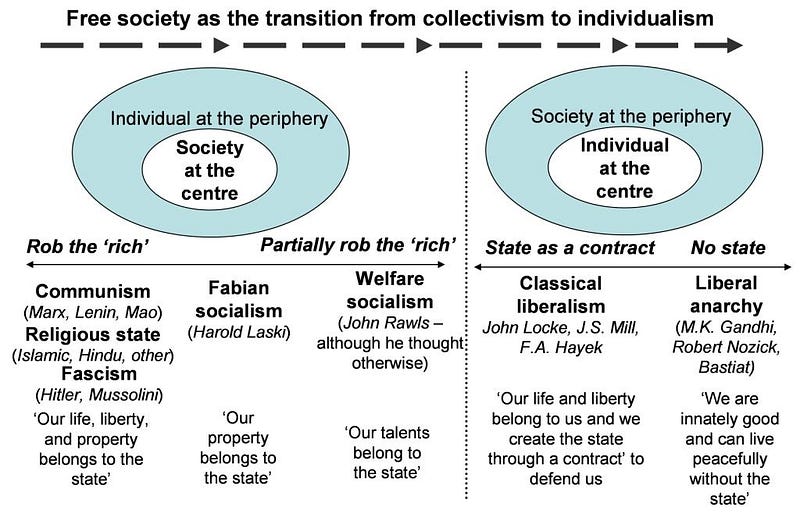
The student generation fears losing something they have always known. The older generation fears we will not regain something we have lost. The conservatives have fought over their betrayal of small government and free trade, as their socialist counterparts dream their hopeful whimpering of democratic progression to Marx’s utopia.
All masks a simple precept suffered by every country: our “leaders” have no ideas. Zero visionary content. They are the proverbial zombies wandering aimlessly to find out where their people are going, so they can lead them.
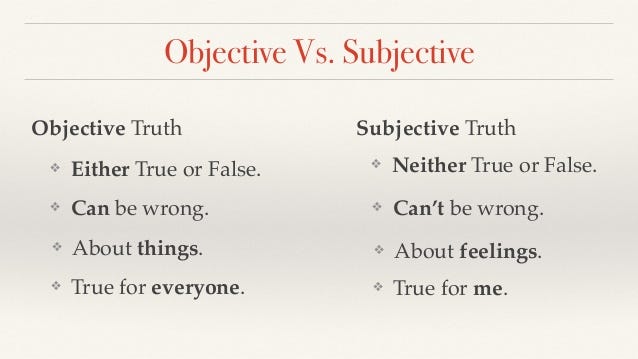
Such is the mess when you attempt to deal with the reality through the lens of your ideology on either side. Any debate made on subjective terms — as opposed to objective truth — is doomed to chaos and inconclusiveness. Our world — even our judicial system — has come to be corrupted by subjective thought, as if the notion of objective analysis is fallacious and/or invalid. This line of “thinking” can be traced directly back to corrupt French and German academics venerated by the Boomer generation, who fell intoxicated with post-structuralism.
These sterile, inept, and spineless moral chameleons are now professors turning out even stupider students.
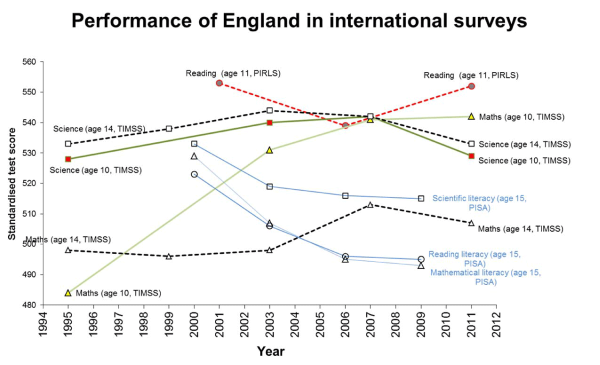
Ordinary British opinion has been the same whichever way you land the coin: dissent, due to fear of losing a stable status quo; either the path we diverged from or the contemporary we adopted. Brits, above all else, are pragmatic, and almost all our systems are based on individualism and objective reasoning. Despite the embarrassing dogmatism incurred from Victorian class strata, we’re not fans of socialism.
The Brexit argument has been made on entirely disingenuous terms: false nostalgia vs. foolish sanctimony; all whilst ministers in limousines try to demonstrate and validate their own supposed “necessity” in our future. There is no doubt whatsoever that the current crop of political “leaders” (for lack of a better term) are possibly the worst band of empty shirts we have suffered since Suez, again, at a most critical moment in our history.
What Would Churchill Do?
Despite the incredible age of Britain, Winston Churchill has been its modern George Washington for a century — a personification of the highest values of statesmanship and fortitude for our leaders to emulate and aspire to. Churchill himself was a US citizen (from his mother’s side); a brilliant writer; an eccentric, stubborn imperialist with impenetrable, stoic heroism to his character.
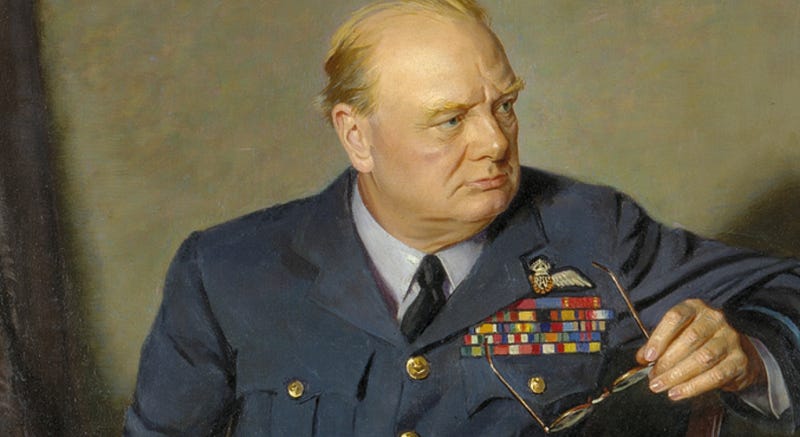
“Where do we stand? We are not members of the European Defence Community, nor do we intend to be merged in a Federal European system. We feel we have a special relation to both. This can be expressed by prepositions, by the preposition “with” but not “of” — we are with them, but not of them. We have our own Commonwealth and Empire.”
Churchill (to Parliament), 11 May 1953
It’s not correct to say he was anti-European (e.g. he touted a Franco union and United States of Europe), but he was highly pragmatic in regards to the advantages of our alliance with the United States — their military and economic strength, his personal relationship with Roosevelt, and the simple fact the US and UK are the biggest investors in each other’s countries. Of course, he was also incensed at the loss of India, and wanted to gas the Kurds (he had his moments).
When taunting and raging against the intransigence of French frenemy De Gaulle and his “Free French”, he intemperately declared, in fury, the Brexiteers’ most misused quote:
“Each time we must choose between Europe and the open sea, we shall always choose the open sea. Each time I must choose between you and Roosevelt, I shall always choose Roosevelt.”
Charles de Gaulle, recalling in his memoir “Unity” (p 154)
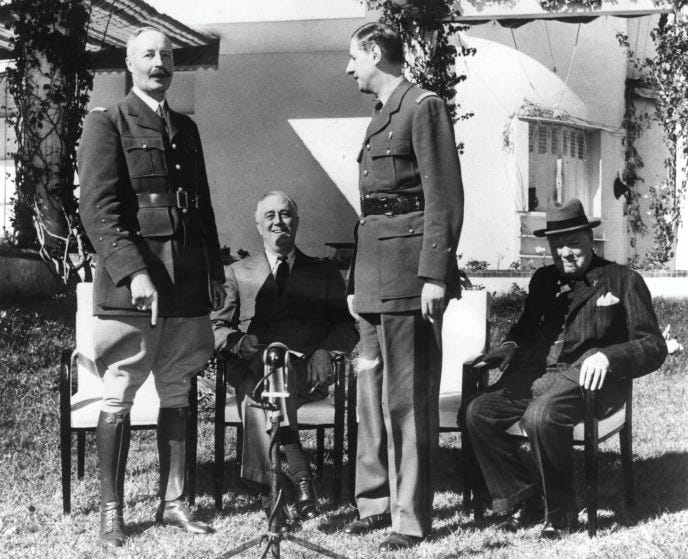
Churchill was speaking of his personal animus towards the French leader — not on a nationalistic level. He also wrote to Roosevelt on 7 June 1944:
“I think it would be a great pity if you and he [de Gaulle] did not meet. I do not see why I have all the luck.”
Its context may be mangled, but it has come to symbolise the sense of frustration felt in the Expedition camp. Remainers and left-wing adult children have relentlessly attempted to discredit and unlink the quote in the hope it will underline the idea itself. Any sensible reading of Churchill in the aggregate makes it clear he was of a generation in whom Europe engendered a significant distrust — and rightly so.
Churchill’s views on appeasing totalitarians were all too clear: it’s like feeding a crocodile, hoping it will eat you last. That, in a nutshell, could be the Prime Minister’s entire Brexit strategy.
The Binding Ties of History and Heritage
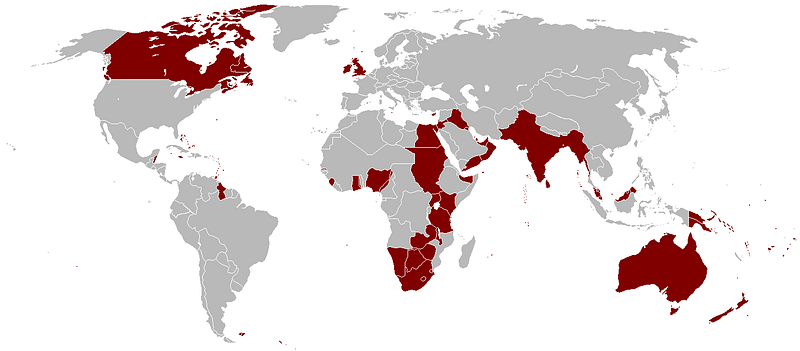
Britain is a maritime merchant state, as well as a nation of shopkeepers. It is essentially a barren lump of rock and marsh — one of the only two major island countries of Europe (i.e. Ireland). With little agriculture to speak of, nor natural resources (coal, gas, iron etc), our prosperity has been built around being the region’s marketplace.
It has been so since Alfred rightly judged our integrity depended on the control of our surrounding waters, and consequently started building ships to protect our shores from Nordic invasion. Our survival — and later, our growth — came from investing in projecting our influence.
There’s no doubt our ancestors held some appalling beliefs. There’s also no doubt that the British committed unforgivable atrocities. However, the current state of the US, Hong Kong, India, Australia, Canada, Singapore, or South Africa, are markedly different from Lebanon, Mali, Brazil, or even Quebec.
Scholars the world over have recognised the impact of the Pax Britannica.
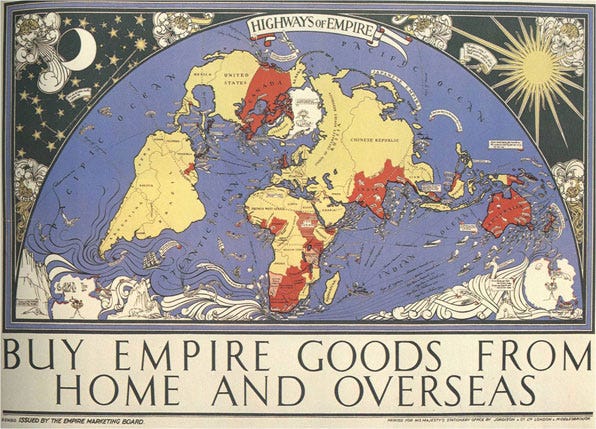
British colonialism was undeniably motivated by trade; in comparison to the other European powers, the British broadly ruled with Roman wisdom: let the people keep their culture, trade and religion. To protect trade routes, you need military reach and strength.
Spain and France imposed their cultures on their conquests (e.g. as you can see in the architecture and Catholicism of Latin America), whereas Britain usually only required their means of advancing the cause of industrialisation: natural harbours, landscapes, and manpower (as you can see in the Caribbean or Africa).
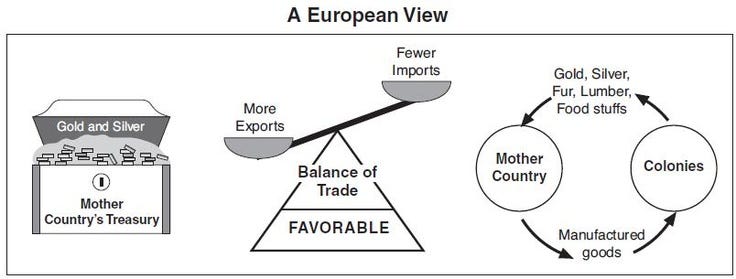
The simple truth is it was the combination of technological transformation of labour and free trade which propelled a small island to become the world’s most powerful nation. Just as it has been the case for the US after WWII, and China in the era of globalised manufacturing.
In our history, — regardless of the reason — we have faced down Spanish imperialism (the Armada), French imperialism (Napeoleon), German & Italian Imperialism (both World Wars) — moreover, taken on China (Opium Wars), Russia (Crimea, the Great Game), half of Africa (the Boers), and plenty of others. The EU is openly and publicly set on imperialism. Our DNA becomes activated.
But by far the biggest contemporary change was the prescient creation of the Commonwealth of Nations after World War II, as decolonisation picked up speed, and the subsequent immigration of former colonial peoples to the Mother country.
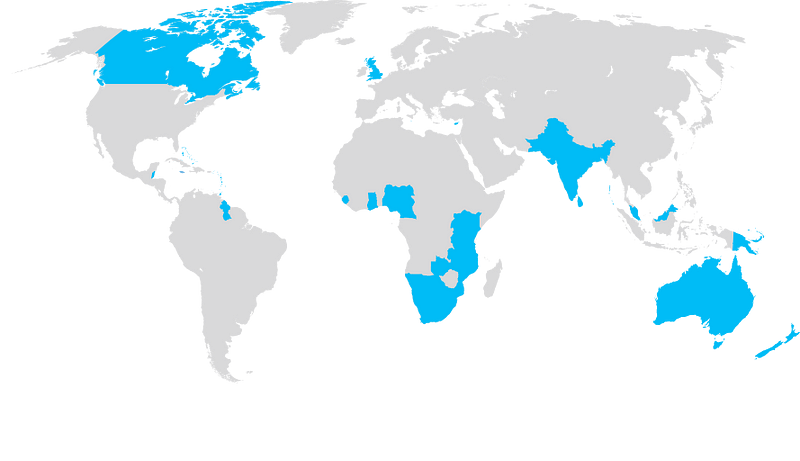
My father welcomed just 8 countries to the first such meeting in 1948. Now the Commonwealth includes 53 countries with 2.4 billion people, a third of the world’s population. Its strength lies in the bonds of affection it promotes, and a common desire to live in a better, more peaceful world. Even with the most deeply held differences, treating the other person with respect and as a fellow human-being is always a good first step towards greater understanding.
Queen Elizabeth II, 2018 Christmas Broadcast
Britain has rarely — with the glaring exception of lucrative India — denied or declined any peaceful request for independence from any of its former colonies. In a poll barely 2 years old, 60% of Jamaicans favoured, like Anguilla before them, the idea of being British again.
And it’s here where we confront our history and look to the seas.
You will rarely find any (public) anti-immigrant sentiment to those from the Commonwealth (perhaps with the exception of Yardie gangs). Why? Because they are as British as fish n’ chips. Broadly speaking, the Commonwealth network shares our pleasures and values:
- Language (English)
- Parliamentary Civility (Westminster)
- Capitalism & Free Trade
- Religion (Christianity)
- Sport (Rugby, Cricket etc)
That is no small list of commonality. It’s in the word itself a “common” i.e. shared, “wealth”, source of prosperity.
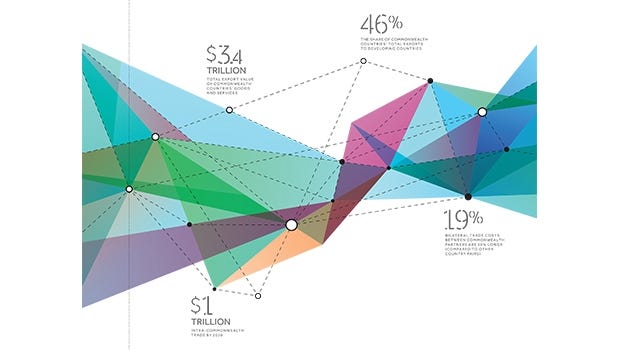
If you considered MPs, the EU, and the Fifth-Column traitors of the British press as authoritative sources, you’d be left thinking the Commonwealth hates the mere mention of the UK. But, again, as you travel, as you talk, you realise just how happy people in most countries are to see the architects of civility and free trade returning to form (all with that nice-sounding accent).
People in Peru and/or the Maldives don’t care about politics. They care about trade.
If you listen to the countries themselves — such as Nigeria, New Zealand, South Korea, — oh, and the world’s largest 22TN economy — the story is a little more positive.
The Commonwealth Secretariat claims trade between members is typically 19% cheaper than global trade because of soft efficiencies such as shared language, laws and standardized consumer products.
We don’t need trade deals to trade in the first place, and particularly if we are a free trade zone.
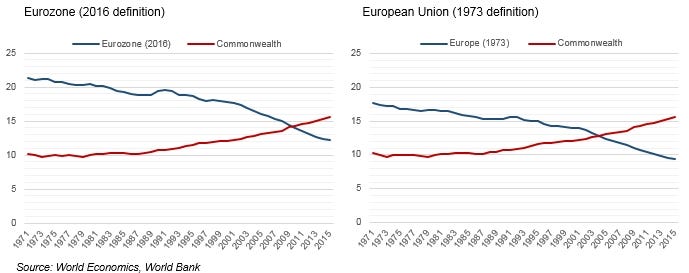
In 1973 the EU made up 17% of the world’s real GDP, while the Commonwealth only claimed 10%. In 2015, the EU accounted for 9%, while the Commonwealth’s share overtook it at 11%. The IMF reported the average GDP growth in the EU is at 1.6%, which is slower than advanced economies’ average at 1.9%. Intra-Commonwealth Exports are projected to increase by $156billion (34%), of which more than US$35 billion will be from the UK.
However, we have a small problem from 1973 which is in our way.
Britain’s entry into the European Economic Community (EEC) in 1973, and its evolution as a member state of the European Union (EU) has meant that for practical purposes, the United Kingdom cannot independently enter into negotiations with Commonwealth states to establish a free trade agreement.
https://en.wikipedia.org/wiki/Commonwealth_free_trade
EU membership has disconnected us from our heritage and closest relationships, almost all of which are buttressed by trade. It’s been rather good for our French and German competitors, who have been held safe from the effects of those, and our unique closeness with the United States.
Trade Fortresses: Always A Strategic Mistake
The EU was formed not only to bind European enemies in trade dependency, but to counter the economic blocs of China, India, and the US. The UK is good friends with all of them.
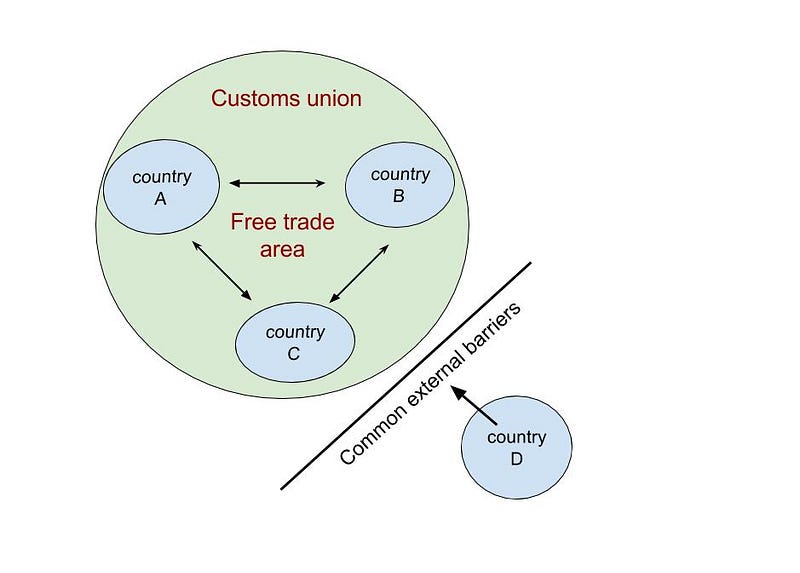
Customs unions are foolish — particularly so in an increasingly globalised world. Tariffs only punish end-consumers: the foreign exporter simply adds the customs charges onto the retail price. A government which levies import tariffs only punishes its own citizens.
With a domestic tariff of 10%, a car which wholesales for $10,000 in the exporter’s country may cost $1,500 to deliver, and $1,000 to import. The end consumer pays $12,500.
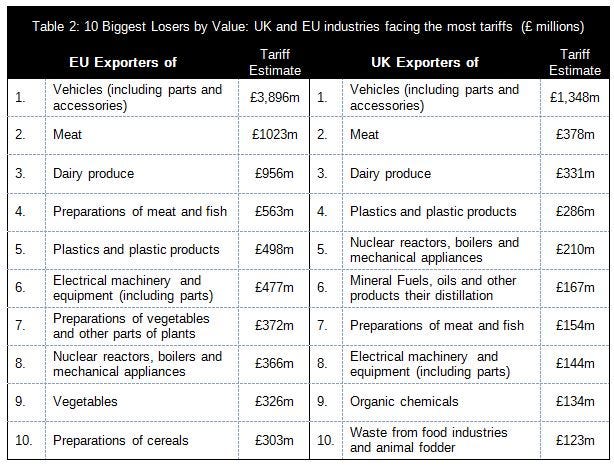
A customs union (free trade area) may well be advantageous if you are a land-bordered European country which does all its trade with its immediate neighbours. Not if you are an island or if you do the majority of your trade with the rest of the world.
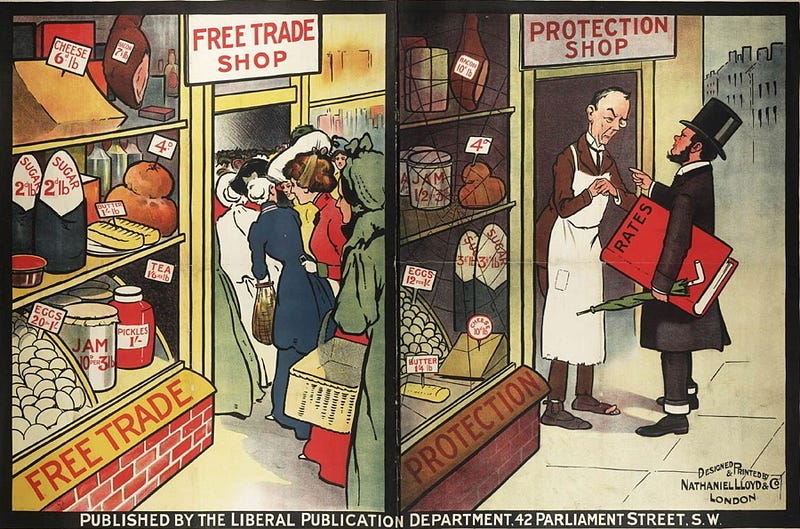
Niccolo Machiavelli warned of what all military leaders know: fortresses are death traps and the best way to arm yourself is to arm your citizenry. The quickest way to defeat an enemy encased within fortification is to cut off their supplies and starve them into surrender.
A customs union is an economic fortress.
“The danger for most people comes when they feel threatened. In such times they tend to retreat and close ranks, to find security in a kind of fortress. In doing so, however, they come to rely for information on a smaller and smaller circle, and lose perspective on events around them. They lose maneuverability and become easy targets and their isolation makes them paranoid. As in warfare and most games of strategy, isolation often proceeds defeat and death.”
Robert Greene, The 48 Laws of Power
France, specifically, has a notorious history of protecting its inefficient, uncompetitive, and backward farmers from the brutality they would receive from the market.
All you need to do is take a walk around a British high street to see everyone dressed in clothes bought from a supermarket, or browse Greece’s economic numbers, to see the effects of famine. We are already an island and our prosperity — as history shows — depends on our ability to be a global marketplace.
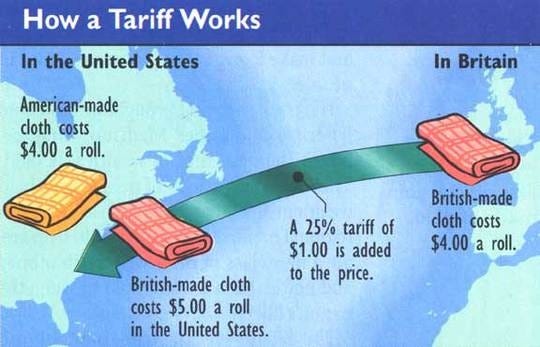
Businesses are forced to buy goods from members of the customs union to keep their costs down. Flowers from Kenya might cost 50c, whereas those from France might be 80c. Tariff blocks placed on the African supplier might put the price up to 90c, even though they are better — protecting the expensive and/or lower quality French seller and forcing the consumer to opt for the lower eventual price.
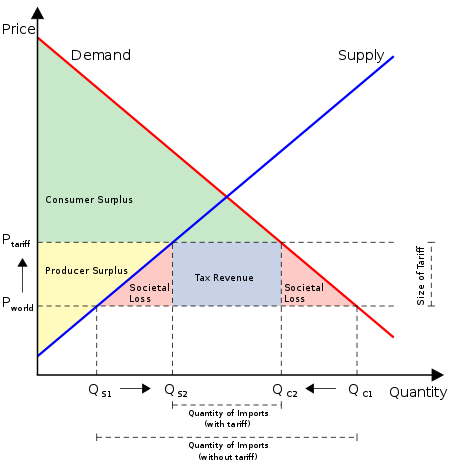
Removing or lowering tariffs does a spectacular thing: foreign exporters flood the market with their products, causing them to compete aggressively on price. Consumers are supplied with more choices, at a lower cost. That, in turn, increases consumption. More companies arriving means more jobs.
There’s a price, however. Not everyone benefits in the short-term, particularly if they don’t venture outwards.
A country whose trade is flourishing within our markets is more likely to reciprocate the arrangement with ours.
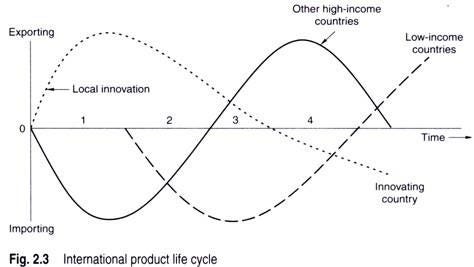
The astute will also recognise that protectionism has a horrendous psychological side-effect: laziness. Competition is the engine of growth and progress; when you remove it, your local economy stops driving forward. It also disrupts monopolies.
Open trade puts domestic suppliers at increased risk and increases pressure from external competition. They have to compete harder; they have to get better, faster, sharper, and more efficient. In evolutionary terms, they must become more selectable.
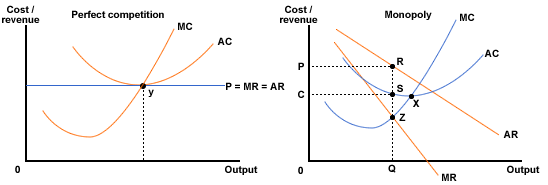
Many will fail. But a nation on its toes, hardened and faster for survival, is better than one on its knees, or than falling off its own bed. A domestic market which knows how to compete is hungrier, tougher, and better-armed for taking on other markets. It is the opposite of EU (ahem: French) trade policy.
The main argument from the Left concerns “nostalgic” Boomers “withdrawing” into a “Little England” mentality away from the greater world. However, considering the EU to be “the world” is exactly what how you would see it if you were trapped behind tall walls.
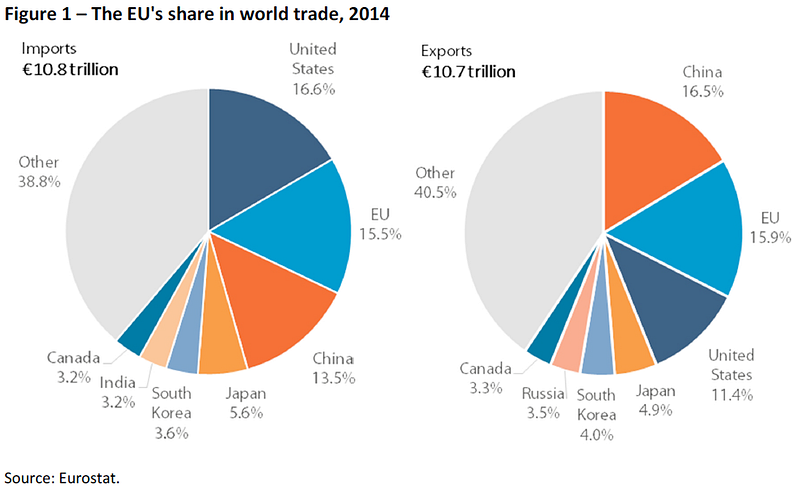
The converse is true. Fortresses are dangerous, and with only 16% of the world’s trade and total countries ($16TN collective GDP compared to China at $8TN and the US at $22TN, 27 of 180), Europe is too small.
The world as it was in 1972 and 1993 is unrecognisable to the ways things are now. The late 90s brought the Information Revolution and the Internet: borders and customs are irrelevant to services, even if they are still applicable to goods. We may have had a need to economically fortify to heal from the Winter of Discontent, but right now, America grabbed the next Industrial Revolution, and the developing world is growing the fastest. Things have changed.
The other problem, of course, is the customs unions carries with it an unnecessary and unwelcome companion: unlimited immigration.
Trade: Government and Trade Deals Not Required
The absurd pantomime of “needing” a trade deal is a damning indictment of how deeply government has encroached on individual liberty. Trade has occurred naturally for 12,000 years without the need for government participation. Governments have no business whatsoever in trade or commerce other than being a customer.
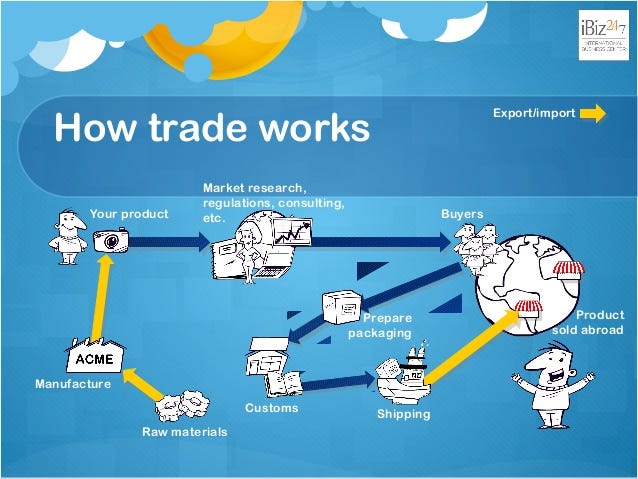
No country has any purpose at all for a “department of trade”, subscription to a “world trade organisation”, nor tariffs. “Trade Deals” are entirely relevant when there are no customs (note: removing the imposition of tariffs does not remove the need for inspections and/or security).
If an individual in China wishes to buy a rug from an individual in Ireland, the arrangement is entirely private and independent from any form of other intervention. The “rules” for the transaction are found in the jurisprudence of the seller’s jurisdiction— contracts, property rights, taxes etc. A government which taxes the export of the rug is foolish because it punishes the seller; a government which taxes the import of it is also foolish because it punishes the consumer.
How a government raises taxes from the success of its merchants is its own domestic matter. If it acts too harshly, the merchant will leave. But there is no scenario in which government intervention in the act of normal trade is productive, helpful, or positive —only in its actions to prevent harm.
The argument has been manipulatively swayed so it morphs into a false dichotomy: whether or not an unnecessary trade deal exists.
The Future Is the EU — Only If You Are In the EU
Economists are quite clear: the EU is failing. Its share of global GDP is consistently decreasing. China, India, and the US dominate, and the developing world is rising. Growth in the British economy is being driven by our trade with the US.
The Special Relationship with the US puts us ahead, our heritage with India puts us ahead, German reliance on our purchasing puts us ahead, and frankly, we know the Chinese game plan after ending their run as the world’s largest economy last time, during the Opium Wars.
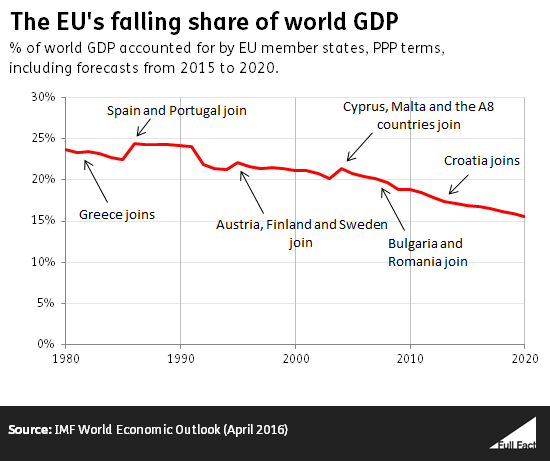
Not only that, but the UK has been growing at a consistently faster rate than the EU itself (albeit with different projections with the Brexit uncertainty).
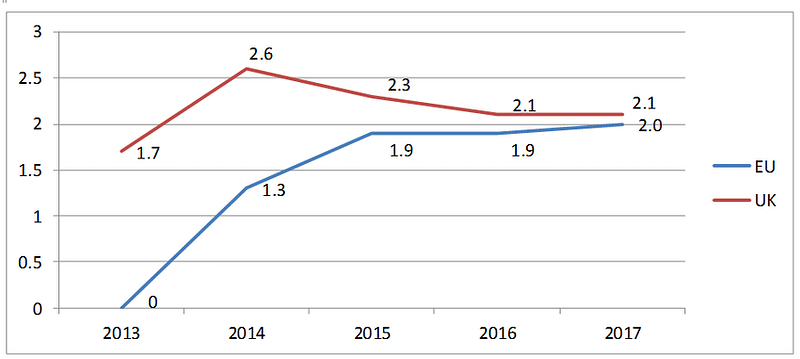
It’s astonishing how so little conversation has been about the basic economics — the figures, the numbers — exactly what businesspeople focus on for decision-making daily. Even a brief glance leads anyone to the conclusion it is not in our interests to be trapped in a customs union with a protectionist Federal power.
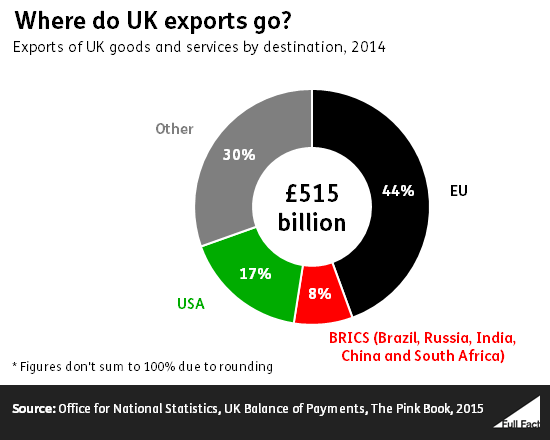
The above diagram shows trade whilst in the customs union. We are not allowed to make our own terms with the BRICS, US, and “Other” categories because EU membership forbids it. God only knows what it could look like if we launched a new trade plan with Brazil.
From our trading data:
We buy £318BN of goods and services from Europe, and £243BN from everyone else. Conversely, the rest of the world buys £284BN from us, and the EU buys £235BN (48%, or 7.4% UK GDP).
We export £100BN to the US and import £66BN — more than twice as much to any other customer, and it’s risen 26% in the last 5 years.
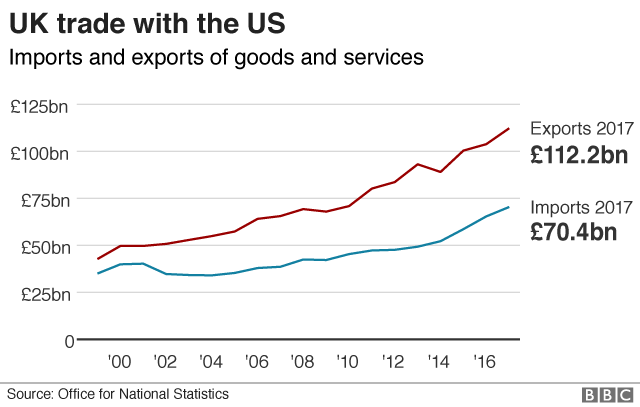
So even within the hopeless customs union, we sell more to the rest of the world than to the EU, and that’s been rising. We’re the EU’s biggest customer, but our trade with the US is what is growing. Double our trade just there, and exports to the EU become numerically trivial.
So, if:
- Our prosperity has always been due to international maritime activity;
- The most successful route to prosperity-at-scale is the technological revolution of labour + free trade;
- Our 80%-services economy is now electronic and borderless because of the Computing Revolution;
- The developing world is forecast to grow the fastest;
- Collective trade flow within the Commonwealth could be worth $3TN alone, and is growing faster than the EU;
- We sell more to countries outside the EU;
- Our trade with the world’s largest economy is accelerating rapidly;
- EU share of global trade is falling;
- We are the EU’s biggest customer;
- then…
What’s the absolutely obvious business decision?
Outside a customs union (i.e. in normal reality), we can buy from whomever we want, on whatever terms we negotiate. In pure business/accounting jargon, we can maximise our sales (exports) and supply chain quality, whilst reducing our costs (imports, domestic competition). That’s good business.
Our politicians are panicking about the complexity of 200 deals — when we could simply remove the need for them entirely. We barely even need government for it. In fact, if government increases costs, it needs to be removed from the processes it is hindering.

The argument the EU is our “biggest trading partner” is entirely circular and fallacious — it is that way quite simply not because of the geographic proximity, but due to being trapped in the customs union with those countries. A union is designed to protect countries within it, but it has the side-effect of containing them. It’s an attempt to create the insular circular economy behind the fortress’s walls.
They do business inside the bloc because any other option is punitively limited. It’s like claiming the prison shop is a prisoner’s main “trading partner” because he buys all his supplies there.
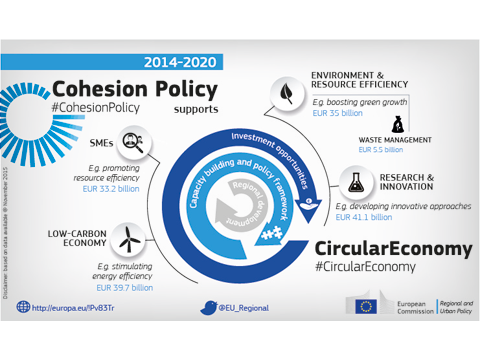
If we could have medicine shortages, buy them from somewhere else who will sell them cheaper. That’s the entire point of this. As if the EU will stop selling to its biggest customer, only to be the cause of a national pandemic; it would be laughable if it weren’t so manipulative.
We have no idea who would be our biggest or best trading partner if we traded fairly outside a customs union, where our set of choices was pre-selected for us. Individually, it’s the United States: $100BN isn’t to be laughed at.
It’s the EU who should be panicking — the developing world is stealing their sales to their biggest customer. Not to mention the loss of $13BN of free cash a year in subsidies for their page-friendly bureaucracy (just the GDPR document alone is 88 pages of utter bullshit), and the prospect of German domination.
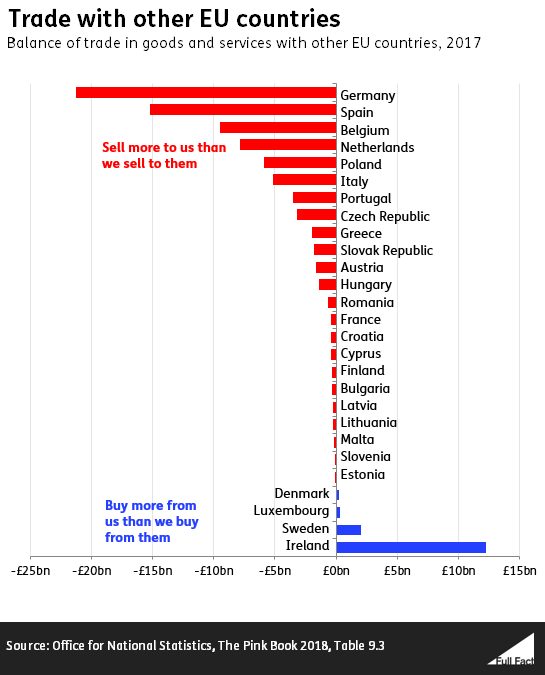
If you’re a German car manufacturer, you’ll be on your knees praying for a UK-wide free trade zone, and that we don’t weaponise tariffs in return to simply get our cars from the US or Japan instead — because at a time we want to increase trade with our family in the US, they could really do with a boost to their auto industry.
Apparently, free markets, free trade, and individual liberty would be the absolute worst thing people who can’t grasp simple economics can think of:
“Post-Brexit, a future Tory or Blairite government might well set up a Singapore-type free trade zone on the Continent’s doorstep. Surely that would be a nightmare for any progressive. The only way to prevent that possiblity is to remain and reform”.
https://www.politicalcompass.org/counterpoint-20181222-brexit
If you believe your country’s aim and ability to trade freely, think freely, and compete disruptively is a “threat”, you are the problem. The world — particularly your enemies — doesn’t care about what you think, and your ideology won’t survive contact with objective reality.
From Regional Factories To Planetary Scale
It’s time to look for the next Industrial Revolution which provides technology to inescapably change human production systems and labour division for the national workforce, not just nerds.
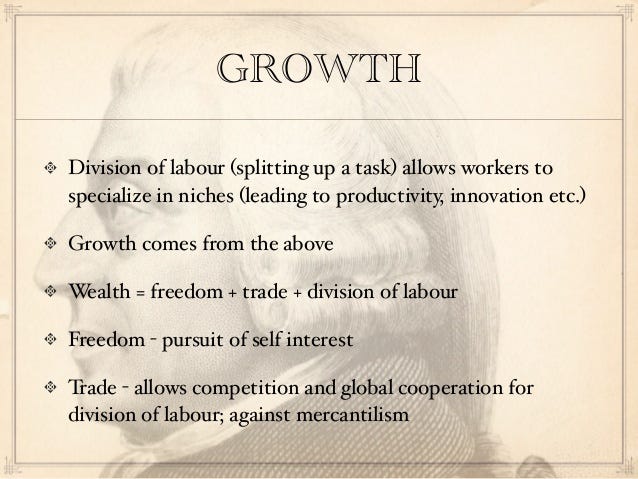
A “technological revolution” such as an amazing thing or good idea is not enough. It must work on a national level, across industries, to fundamentally mutate the whole economy ahead of other countries. Almost invariably that comes down to increasing the speed, efficiency, and scale of production; whilst simultaneously increasing specialisation, i.e. division of labour. The latter helpfully also creates new Pareto distributions.
The bottom line: growth comes from the pursuit of creating new specialists. AI, by contrast, displaces labour — it does not do this.
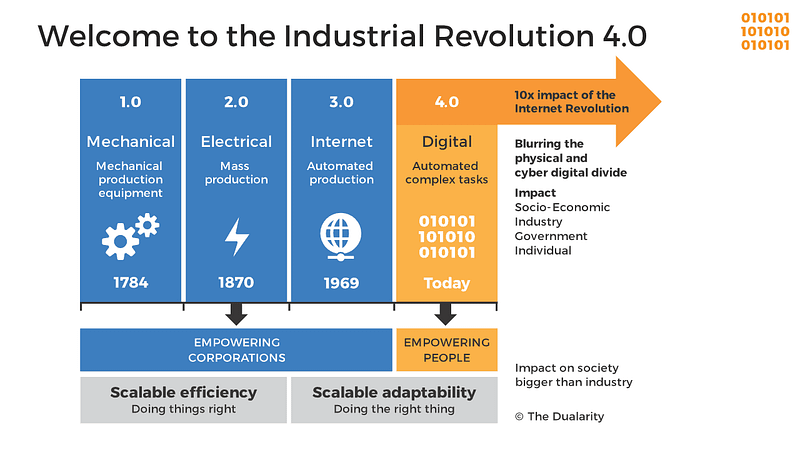
Amongst the candidates could be:
The Pareto Revolution: a mathematical solution to the Pareto Distribution of wealth in society and ends the argument for socialism.
Reward: £1 Billion tax-free Sterling.
The Free Energy Revolution: de-centralized infrastructure for generating (portable) electricity without the need for terra resources (oil, gas, coal etc).
Reward: £1 Billion tax-free Sterling.
The AI Revolution: low-cost software and robotics able to autonomously manage manufacturing and production processes for small businesses.
The E-Commerce Revolution: control of the “digital shipping lanes” and fulfillment of the developing world’s markets.
The Propulsion Revolution: engines which can provide hypersonicand ultrasonic speeds at ordinary altitudes for commercial passenger travel.
Reward: £1 Billion tax-free Sterling.
The Technocracy Revolution: cryptographic consensus mechanismswhich allow direct secure, reliable micro-referenda, issue by issue.
Reward: £1 Billion tax-free Sterling.
The Knowledge Exchange Revolution: new immigration models, and exporting human capital to the developing world.
The Surgical Revolution: technology which can conduct highly invasive procedures from outside the body.
Reward: £1 Billion tax-free Sterling.
The Electronic Warfare Revolution: anti-technology which enables the complete destruction of an enemy’s defense capabilities and civilian infrastructure at unimaginable scale.
Reward: £1 Billion tax-free Sterling.
Governments cannot create jobs, markets, or trade. But they can prepare the fertile ground, be customers, provide venture capital, and redistribute wealth surplus which allows new entrants to plough new fields.
The dark secret of the EU’s mercantilism is it is not compatible with the way the world has changed since its inception 20 years ago. China is reaching outward, whilst the EU is fortifying inward.
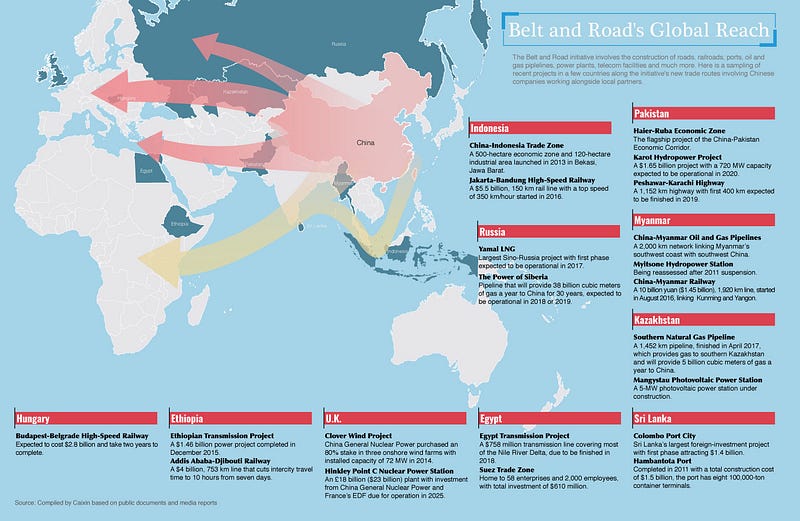
The collective intellect of EU and UK politicians — wasted on incoherent French sociological philosophy — is not enough to surmount the complexity caused by technological advancement and the industrialisation of the developing world.
Our politicians are panicking because they have no idea what to do and are unable to successfully execute on the direction the people have ordered them to go.
The Information Revolution is about efficiency and global scale through technology, whereas the EU is an ever-expanding bureaucracy of forms and regulations. The outlook of trade is global, whereas theirs is of a circular, insular zone within the walls of a doomed fortress. It is the developing world who are growing, and the most competitive nations (China, India, etc) who are transforming and burgeoning with a new middle class.
A Free Independent Future Of New Ideas
No Deal isn’t a problem if you have other plans. It’s not enough to vote against something: we need an alternative future to vote for.
For that, you need a vision, which coalesces from new ideas. Those require creativity, and wisdom to understand the problem. Together we call them a venture.
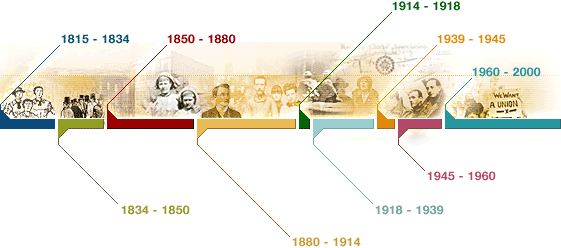
English history is like the waves of the sea, continually surging from one transformation to another. From rebuilding after Viking invasions; to divorcing Rome; to mutating agriculture into automation; to fighting Imperial war machines; to socialising institutions; and now, to divorcing the continental monster emerging in our midst in favour of expansion into the surrounding oceans once again.
The drive of the wave comes with its equivalent moments of crest and crash. There is a real sense of romance to the quest for adventure and the unknown.
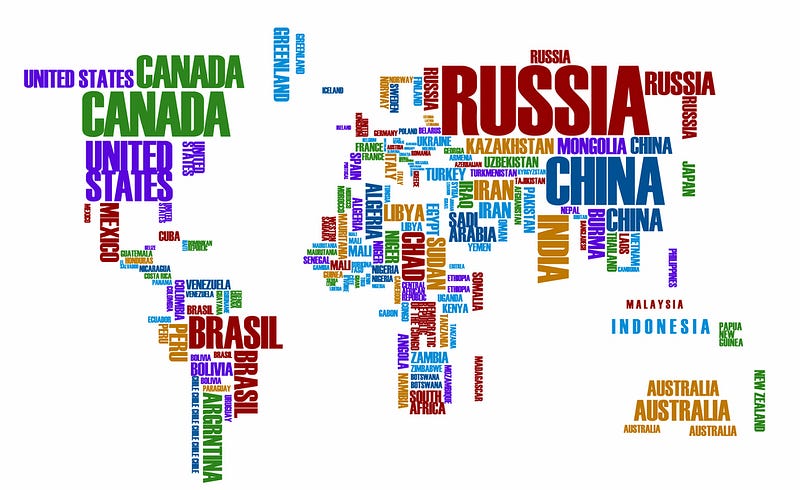
- If we were to accelerate our trade and immigration with the US alone (our closest partner, in whom we are the largest investor), we could aim to double our GDP to overtake France, Germany, and Japan within 20–30 years.
- Furthermore, the long-derided Commonwealth Free Trade Area, if put into the hands of visionaries, could provide all 53 members with access to a bloc predicted to have tradeflow worth $2.75TN in 2030. There’s excitement for it, and 26 countries have already agreed to an African zone in 2011.
- If we were daring enough to unilaterally remove tariffs and corporation tax (i.e. declare the UK a free-trade zone in its entirety), we would have no need for trade deals at all, and could easily out-maneuver the EU low-tax jurisdictions (Ireland, Luxembourg, Monaco, Switzerland etc) when coupling it with the Cayman Islands, BVI, and Turks & Caicos. The EU would have customs tariffs and tax, whereas the UK would have none. We’d take a hit, but that’s the opportunity cost.
- If we were to forge deeper links with Guyana through our historical links via Trinidad, we could have access to the newest oil supply, and even — bizarrely — space research. Our friendship with Chile would give us deeper links with South America’s fastest growing country.
When a destitute island in the Bahamas was designated by the British in the 1950s as the world’s 2nd Free Trade Zone (after Colon, Panama), it became known as the fastest growing city in the world within a decade (the “Magic” city).
Customs Unions and Collectivist ideology works for a continental bloc. It does not work for islands who depend upon functioning as a marketplace.
Free Trade Areas do not need bilateral trade agreements. You simply let people trade freely, unilaterally, and get out of their way, unilaterally.
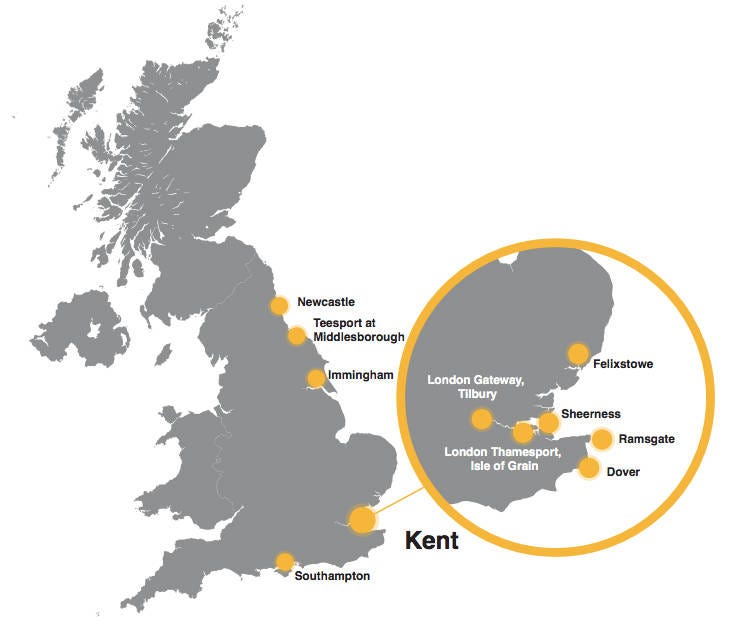
The most terrifying words the EU could ever hear:
Ladies and Gentlemen, from August 30 2019, the United Kingdom — England, Wales, Scotland, and Northern Ireland, its surrounding islands, and its Overseas Territories, will be an entirely Free Trade Area. There will be no taxes or tariffs on the exchange of trade whatsoever, and complete freedom of trade and movement for the creative industries. Moreover, corporation tax will be reduced to 1%, capital gains tax abolished for businesses under £250,000 turnover, and income tax abolished for incomes under £50,000. Citizens of the United States without a criminal record will be granted automatic two-year temporary residency upon arrival at a port of entry, while any EU citizen with a criminal record or without employment within three years will be expelled. We invite all the heads of state of the Commonwealth to a summit discussing a global Commonwealth visa and larger Free Trade Area.
Macron’s face would be priceless.
No cost to compete in our markets to sell your goods and services. A market with more money to spend on them. A better place to headquarter than Ireland or Luxembourg. A marketplace for the hungry developing world. A native home for American wealth. Connected to a massive rival trade bloc on the horizon.
No Deal is No Problem if you have a better plan.
The Death Throes of Fifth Column Collectivism
In one of the most pivotal moments of our contemporary history, the debate has been held from the gutter in one direction, the Left — on the level of slander and collectivist character assassination. Neither of which adds anything of substance to the gravity of the affair.
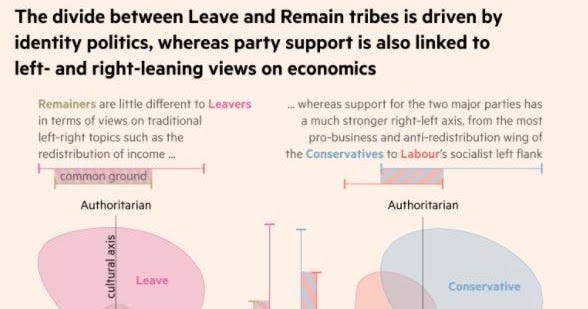
The US ambassador has openly said the country “needs leadership”, and the US president, in turn, has said any deal looks “great for the EU”. We have a prime minister who snaked her way into power, voted to stay in the EU, can’t negotiate to save her life, and thinks crawling back to a bloc which holds the country in contempt will cause them to be nice to her. Oh, and it’s her deal, or “no Brexit” for the unruly schoolchildren.
Unfortunately, 17.4M Brits gave her and her slimy bunch of cowards instructions of the type toddlers have to understand; leave, or remain.
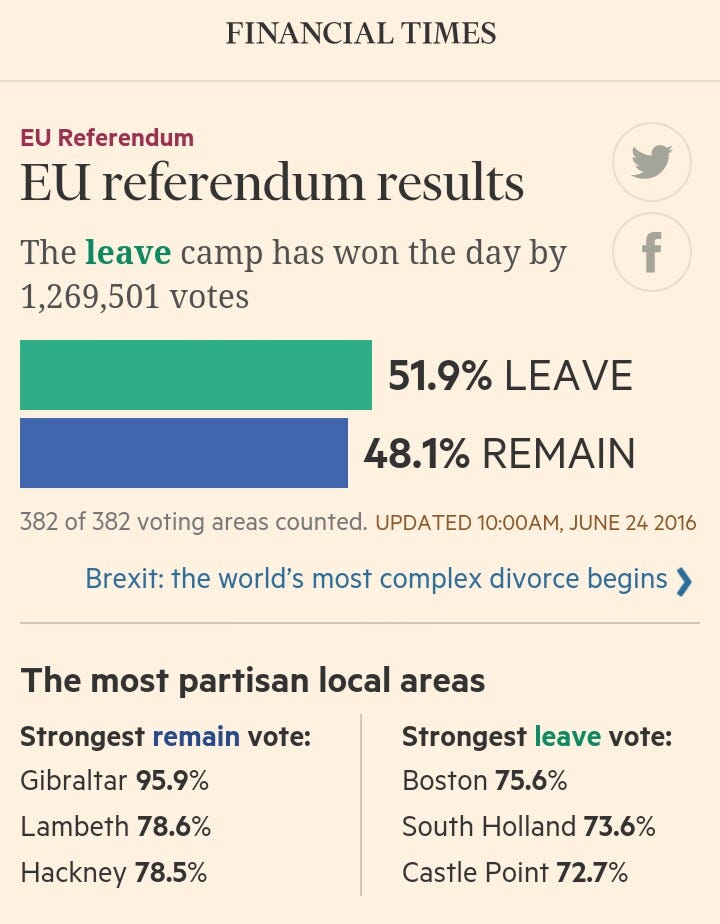
The EU-funded dramatisation of the saga (“Brexit: The Uncivil War”) is the latest naked propagandizing which defies the definition of artistic merit. The fabricated social script goes something like this:
A group of scurrilous, fact-less, egotistical outsiders, in association with cynical capitalist consultants, led a criminal conspiracy to manipulate lower-class, intrinsically racist people to vote to leave Utopia via adverts on social media and outright public lies; but didn’t realise how much they would regret the consequences of their actions. A valiant establishment lost their righteous battle to save the country.
They lost a battle to consign the country to the museum of irrelevance.
If it’s done anything, Brexit has pulled back the curtain on the sort of people who have catastrophically sterilised it over the last half-century — as they insult everyone else with that charge.
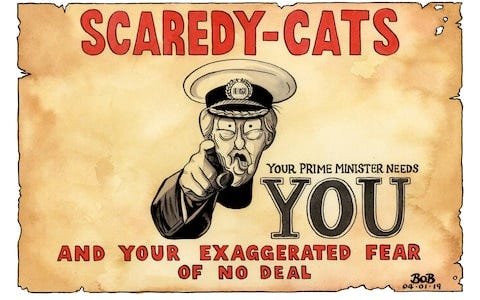
The same individuals who are so politically blind they believe the opposite of socialism (a state-planned worker economy) is fascism (corporatist state worship) when it is anarchy. The former two are both totalitarian whereas their diametric cousin is unlimited liberty (also dangerous). It’s like they are incapable of conceiving of a world where the government is not the source of existence —eerily similar to the way an infant sees its adult parents.
Stubbornly clinging to ideas which always bring total disaster is not “progress”. Collectivism is only “progress” when narrowly defined within Marx’s Stages of History.
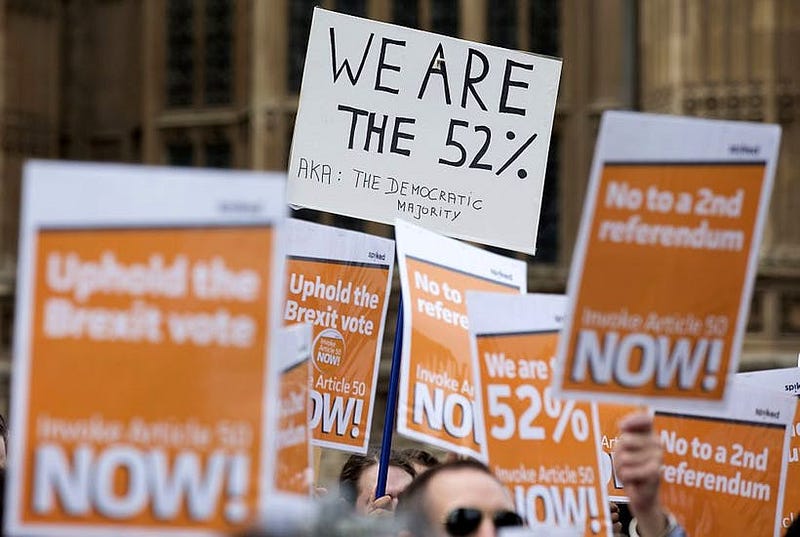
These same politicians, academics, journalists, and radical collectivist groups, even now, have the sheer audacity to “re-brand” the word “populist” as a pejorative, and call their EU-inspired strategy of re-voting until the “correct” result, the “People’s” vote. And by “People”, they mean them; the radical minority; those who bitterly lost (not most Remainers, who are broadly stoic).
All contending the atrociously disingenuous argument “nobody could have known what we know now”, as if we were all supposed to be experts in the minutiae of veterinary procurement before choosing between two single words.
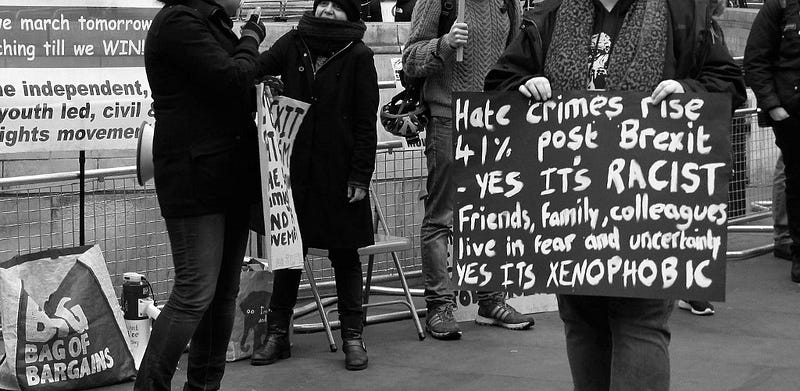
The British people are sick of being called “racist” for wanting controls on mass immigration; “colonialists” for prioritizing their relationship with their heritage; “nationalists” for wanting to preserve their ancient democracy; “luddites” for not embracing the “progress” of a European Superstate; “evil capitalists” for not subscribing to the great Democratic Socialism Project; and “little Englanders” for enjoying the other 85% of the world’s trade on their own terms.
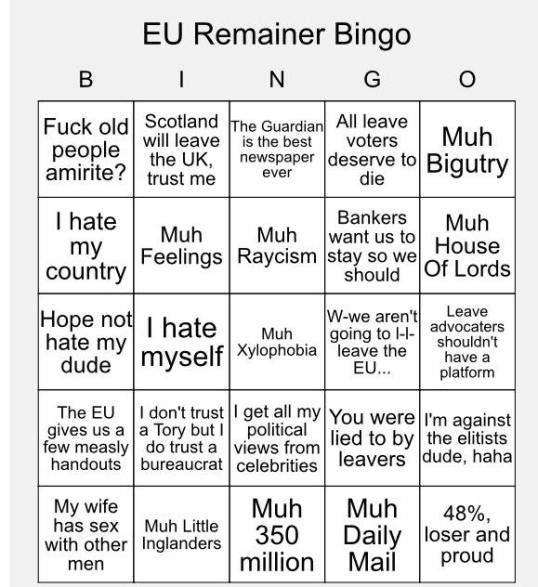
We’re all sick of activist academics, whiny press commentators, and febrile politicians “explaining” — downwardly — how the invalidity of “ordinary” people’s decisions will be the cause of Armageddon.
The worst criticisms those who voted to remain in the EU suffer are of being establishment pawns or “weak”. Those who voted Leave are racist, anti-immigrant, malevolent, nostalgic, ignorant, uneducated, and, not to mention, leading everyone to destruction.
Rule 13 from Rules for Radicals by Saul Alinsky (a playbook for the Totalitarian Left):
13. “Pick the target, freeze it, personalize it, and polarize it.”
This process of laundering and polarising is known as ideological subversion.
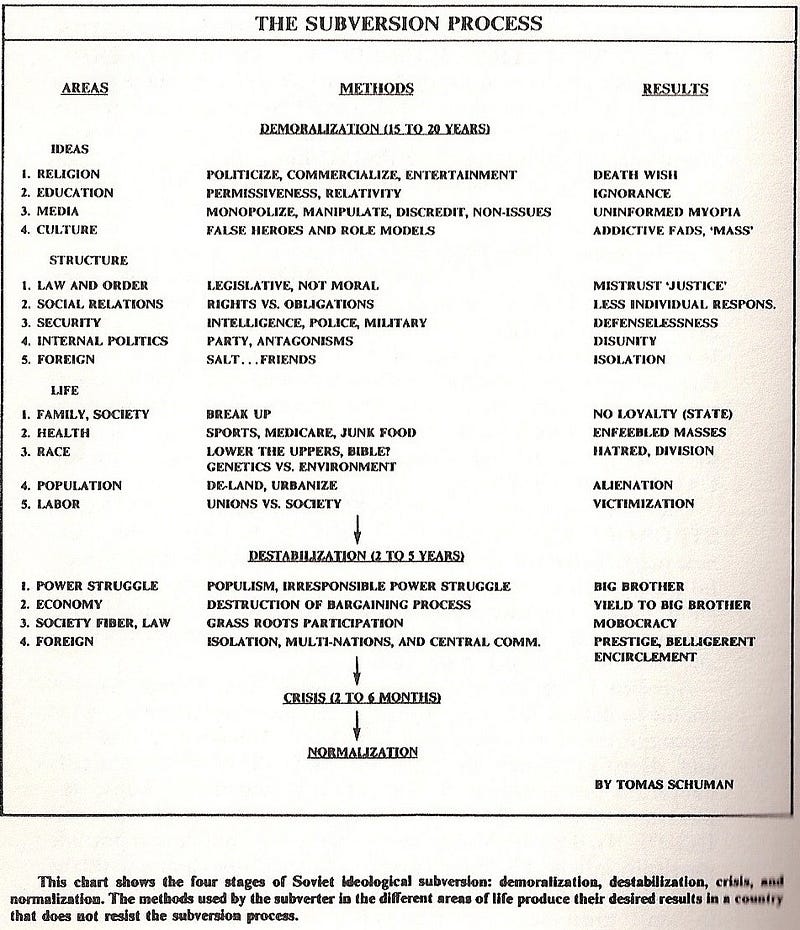
After 40 years, the time has come when Brits decided what they’ve always decided — the EU has morphed beyond recognition, and it’s not acceptable having a foreign power thinking it can make our decisions for us.
Project Fear didn’t work. Collectivist character insults haven’t worked. Dire proclamations of Dante’s Inferno aren’t working. It’s almost as if Brits don’t recognise that because they chose what they wanted all on their own without the need for the “guidance” of their Left-leaning “moral superiors”.
Reversion to collectivism is not a future for anyone; nor is it a voluntary “ascension” to morally purer world order posited by European intellectuals a century ago.
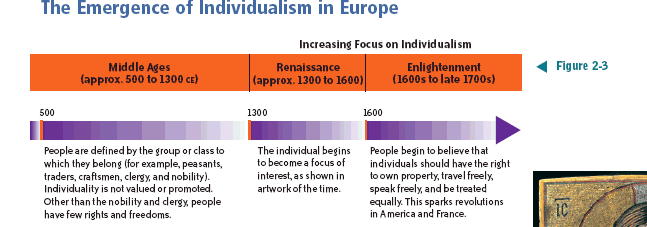
Brexit is an old war with new clothes: that of control over the means of production, and collectivism vs. individualism.
Yet despite all their attempts over the last 60 years to drain its blood, British collectivists are desperately fighting dirty not to be swallowed by our history, character, and what they left of our sense of individual identity.
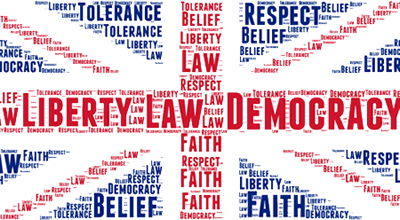
The British people, in their own way, are leading again — by rejecting supranational/transnational federalism, and reminding the world of the true essence of democracy itself: dissent.



